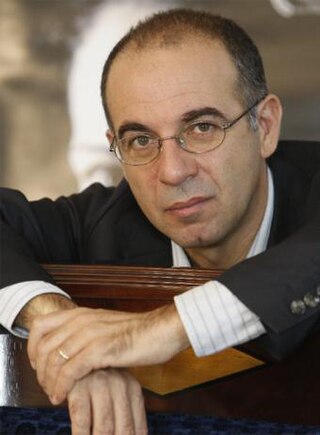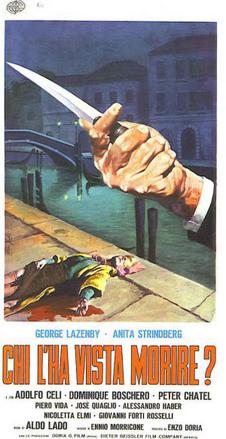
Ennio Morricone was an Italian composer, orchestrator, conductor, trumpeter, and pianist who wrote music in a wide range of styles. With more than 400 scores for cinema and television, as well as more than 100 classical works, Morricone is widely considered one of the most prolific and greatest film composers of all time. He received numerous accolades including two Academy Awards, three Grammy Awards, three Golden Globes, six BAFTAs, ten David di Donatello, eleven Nastro d'Argento, two European Film Awards, the Golden Lion Honorary Award, and the Polar Music Prize in 2010.

Giuseppe Tornatore is an Italian film director and screenwriter. He is considered one of the directors who brought critical acclaim back to Italian cinema. In a career spanning over 30 years he is best known for directing and writing drama films such as Everybody's Fine, The Legend of 1900, Malèna, Baarìa and The Best Offer. His most noted film is Cinema Paradiso, for which Tornatore won the Academy Award for Best Foreign Language Film. He has also directed several advertising campaigns for Dolce & Gabbana.

A Fistful of Dollars is a 1964 spaghetti Western film directed by Sergio Leone and starring Clint Eastwood in his first leading role, alongside Gian Maria Volonté, Marianne Koch, Wolfgang Lukschy, Sieghardt Rupp, José Calvo, Antonio Prieto and Joseph Egger. The film, an international co-production between Italy, West Germany and Spain, was filmed on a low budget, and Eastwood was paid $15,000 for his role.

The Mission is the soundtrack from the film of the same name, composed, orchestrated, conducted and produced by Ennio Morricone. The work combines liturgical chorales, native drumming, and Spanish-influenced guitars, often in the same track, in an attempt to capture the varying cultures depicted in the film. The main theme, "Falls", remains one of Morricone's most memorable pieces, and has been used in numerous commercials since its original release. The Italian song "Nella Fantasia" is based on the theme "Gabriel's Oboe" and has been recorded by multiple artists including, Sarah Brightman, Amici Forever, Il Divo, Russell Watson, Hayley Westenra, Jackie Evancho, Katherine Jenkins, Amira Willighagen and Yasuto Tanaka.

Once Upon a Time in the West: The Original Soundtrack Recording is a soundtrack composed by Ennio Morricone, from the 1968 western film of the same name directed by Sergio Leone, released in 1972. The film score sold about 10 million copies worldwide.
"Nella Fantasia" is a song sung in Italian based on the theme "Gabriel's Oboe" from the film The Mission (1986). With music by composer Ennio Morricone and lyrics by Chiara Ferraù, "Nella Fantasia" is popular among classical crossover singers, and was originally released in 1998 by Sarah Brightman. It has since been covered by many artists.
"Gabriel's Oboe" is the main theme for the 1986 film The Mission, with Robert de Niro, Jeremy Irons, Liam Neeson and directed by Roland Joffé. The theme was written by Italian composer Ennio Morricone, and has since been arranged and performed several times by artists such as Yo-Yo Ma, Holly Gornik, and Brynjar Hoff, among others. The theme has been called "unforgettable" and a "celebrated oboe melody". Vocalist Sarah Brightman convinced Morricone to allow her to set lyrics to the theme to create her own song, "Nella Fantasia". In 2010, Morricone encouraged soprano Hayley Westenra to write English lyrics for "Gabriel's Oboe" in her album Paradiso.
The Nastro d'Argento is a film award assigned each year, since 1946, by Sindacato Nazionale dei Giornalisti Cinematografici Italiani, the association of Italian film critics.

The Good, the Bad and the Ugly: Original Motion Picture Soundtrack was released in 1966 alongside the Western film The Good, the Bad and the Ugly, directed by Sergio Leone. The score is composed by frequent Leone collaborator Ennio Morricone, whose distinctive original compositions, containing gunfire, whistling, and yodeling permeate the film. The main theme, resembling the howling of a coyote, is a two-note melody that is a frequent motif, and is used for the three main characters, with a different instrument used for each one: flute for Blondie, arghilofono for Angel Eyes, and human voices for Tuco.

The David di Donatello for Best Score, known as the David di Donatello per il miglior musicista prior to 2021, is a film award presented annually by the Accademia del Cinema Italiano to recognize outstanding efforts on the part of film music composers who have worked within the Italian film industry during the year preceding the ceremony. The award has been given every year since 1975, with the exception of the 1979 and 1980 editions.

Who Saw Her Die? is a 1972 Italian giallo film directed by Aldo Lado and Vittorio De Sisti, starring Anita Strindberg and George Lazenby. Lazenby and Strindberg play the parents of a murdered girl, who pursue her black-veiled killer throughout Venice. Who Saw Her Die? features music by Ennio Morricone, and has seen positive reviews for Lazenby's performance.
"The Good, the Bad and the Ugly" is the theme to the 1966 film of the same name, which was directed by Sergio Leone. Included on the film soundtrack as "The Good, the Bad and the Ugly ", the instrumental piece was composed by Ennio Morricone, with Bruno Nicolai conducting the orchestra. A cover version by Hugo Montenegro in 1967 was a pop hit in both the US and the UK. It has since become one of the most iconic scores in film history.
"Chi Mai" is a composition by Ennio Morricone written in 1971. It was first used in the film Maddalena (1971), later in the films Le Professionnel directed by Georges Lautner (1981), as well as in the television series An Englishman's Castle (1978). In 1981, it was used as the theme music for the BBC series The Life and Times of David Lloyd George and the BBC release of the theme reached number 2 on the UK Singles Chart.

Paradiso is a studio album by New Zealand soprano Hayley Westenra, in collaboration with Italian maestro Ennio Morricone. It was released worldwide beginning 18 April 2011 in New Zealand.

Django Unchained is the soundtrack to Quentin Tarantino's motion picture Django Unchained. It was originally released on December 18, 2012. The soundtrack uses a variety of music genres, though with an especially heavy influence from Spaghetti Western soundtracks.

L'anima vola is the eighth studio album by Italian singer–songwriter Elisa, released on 15 October 2013 by Sugar Music. It's the singer-songwriter's first recording project entirely in Italian, the album won the Premio Lunezia for "musical and literary value".

The Hateful Eight (Original Motion Picture Soundtrack) (stylized as Quentin Tarantino's The H8ful Eight) is the soundtrack album to Quentin Tarantino's 2015 motion picture The Hateful Eight. The soundtrack includes the first complete original score for a Tarantino film and is composed, orchestrated and conducted by Ennio Morricone. Morricone composed 50 minutes of original music for The Hateful Eight.

Ennio: The Maestro, also known as The Glance of Music, is a 2021 documentary film directed by Giuseppe Tornatore, celebrating the life and legacy of the Italian composer Ennio Morricone, who died on 6 July 2020. The film consists of interviews with directors, screenwriters, musicians, songwriters, critics and collaborators who have worked with him or who have enjoyed him throughout his long career.











